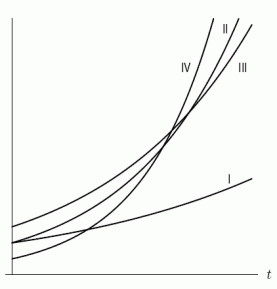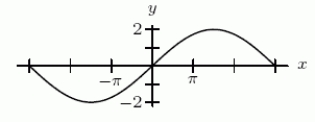Exam 1: Functions and Change
Exam 1: Functions and Change204 Questions
Exam 2: Rate of Change: the Derivative132 Questions
Exam 3: Shortcuts to Differentiation178 Questions
Exam 4: Using the Derivative94 Questions
Exam 5: Accumulated Change: the Definite Integral93 Questions
Exam 6: Antiderivatives and Applications122 Questions
Exam 7: Probability68 Questions
Exam 8: Functions of Several Variables134 Questions
Exam 9: Mathematical Modeling Using Differential Equations121 Questions
Exam 10: Geometric Series65 Questions
Select questions type
Each of the curves in the following figure represents the balance in a bank account at time t after a single deposit at time t = 0. Assuming continuously compounded interest, which curve represents the smallest initial deposit? 
(Short Answer)
4.8/5  (34)
(34)
The population of Nicaragua was 3.6 million in 1990 and growing at 3.4% per year. Let P be the population in millions, and let t be the time in years since 1990. Express P as a function of t. Select all that apply.
(Multiple Choice)
4.8/5  (44)
(44)
The population of Los Angeles, California was 2,811,801 in 1970 and was 3,448,613 in 1994. The average rate of change in the population of Los Angeles between 1970 and 1994 was _____ people per year.
(Short Answer)
4.9/5  (31)
(31)
Which of the following are power functions? Select all that apply.
(Multiple Choice)
4.8/5  (33)
(33)
Coulomb's law says that the electrical force between two charged objects is directly proportional to the product of the quantity of charge on the objects and inversely proportional to the square of the distance between the objects. Let  and
and  be the charge on the two objects. Let d be the distance between the objects and F be the electrical force between them. Translate Coulomb's Law into mathematical symbols.
be the charge on the two objects. Let d be the distance between the objects and F be the electrical force between them. Translate Coulomb's Law into mathematical symbols.
(Multiple Choice)
4.8/5  (40)
(40)
Write an equation of a periodic function with amplitude 35, vertical shift 50, period  , and horizontal translation (phase shift) 2 units to the right.
, and horizontal translation (phase shift) 2 units to the right.
(Multiple Choice)
4.8/5  (32)
(32)
A standard cup of coffee contains about 100 mg of caffeine, and caffeine leaves the body at a rate of about 17% an hour. How many mg of caffeine are left in the body after 6 hours if this rate is continuous? Round to 2 decimal places.
(Short Answer)
4.9/5  (36)
(36)
An exponentially decaying substance was weighed every hour and the results are given below. If the formula  gives the weight of the substance, Q, at time t in hours since 9 am, then
gives the weight of the substance, Q, at time t in hours since 9 am, then  =_____ and k=_____. Round k to 2 decimal points.
=_____ and k=_____. Round k to 2 decimal points. 
(Short Answer)
4.7/5  (30)
(30)
Assume that the function shown in the following table is periodic. What is  ?
? 
(Short Answer)
5.0/5  (39)
(39)
Temperature in Town A oscillates daily between  F at 4am and
F at 4am and  F at 4pm. If
F at 4pm. If  is a formula for the temperature in Town A in terms of time, where time is measured in hours from 4 am, then A =_____, B =_____, C =_____, and D =_____.
is a formula for the temperature in Town A in terms of time, where time is measured in hours from 4 am, then A =_____, B =_____, C =_____, and D =_____.
(Short Answer)
4.7/5  (41)
(41)
Use your calculator to find all of the solutions to the equation  . Round your answers to 2 decimal places.
. Round your answers to 2 decimal places.
(Short Answer)
4.8/5  (40)
(40)
Find the value for b in the following table of values for the linear function f. 
(Short Answer)
4.9/5  (35)
(35)
The total sales of household computers in the U.S., as measured by sales to retail consumer dealers, in millions of dollars, was 2,385 in 1984 and 16,585 in 1997.
A. Find the average rate of change in sales between 1984 and 1997 (in millions of dollars, to the nearest tenth).
B. Use your answer to estimate total sales in 2000 (in millions of dollars, to the nearest tenth).
(Short Answer)
4.9/5  (38)
(38)
The size of a bird population on an island can be described by a sinusoidal graph. The number of birds on the island decreased from a maximum of 20,000 in 1943 to a minimum of 12,000 in 1989, and then began increasing again. In what year will the population begin decreasing again?
(Short Answer)
4.7/5  (27)
(27)
A $3000 pump depreciates linearly . It is worth $2200 in 4 years. Find a formula for the value of the pump, V, as a function of time, t (in years) since it was purchased.
(Short Answer)
4.8/5  (31)
(31)
The following table gives values for three different functions. One of the functions is neither linear nor exponential. Is that function increasing or decreasing? 
(Short Answer)
4.9/5  (33)
(33)
Give a formula for the following sinusoidal function as a transformation of  .
. 
(Multiple Choice)
4.9/5  (36)
(36)
The illumination, I, of a candle is inversely proportional to the square of its distance, d, from the object it illuminates. Write a formula that expresses this relationship.
(Short Answer)
4.8/5  (38)
(38)
Showing 121 - 140 of 204
Filters
- Essay(0)
- Multiple Choice(0)
- Short Answer(0)
- True False(0)
- Matching(0)